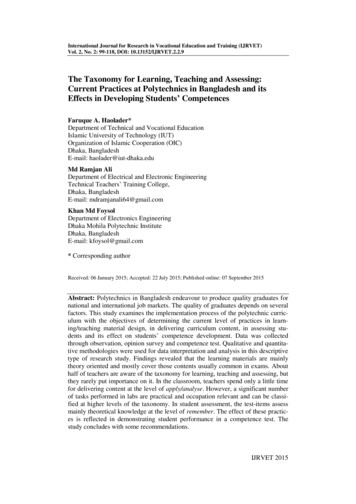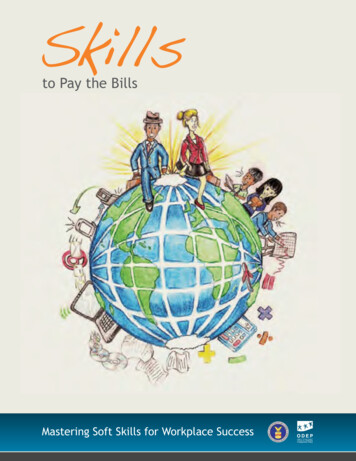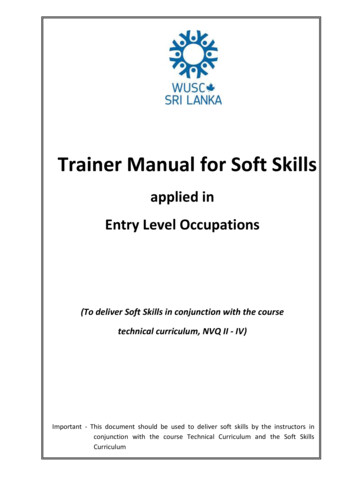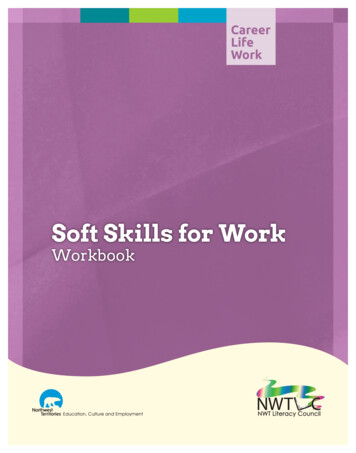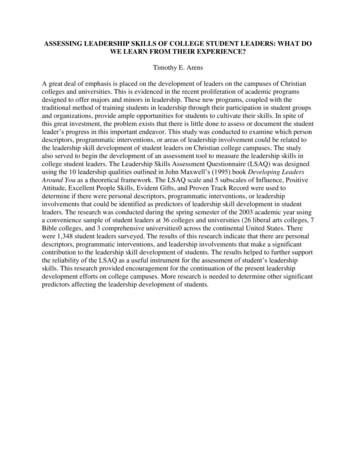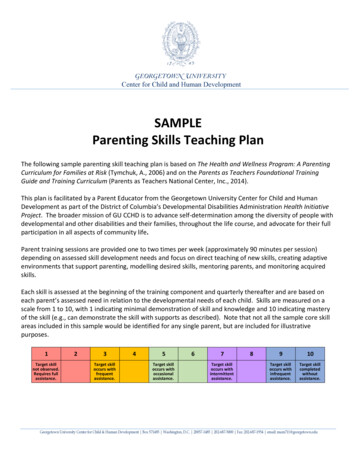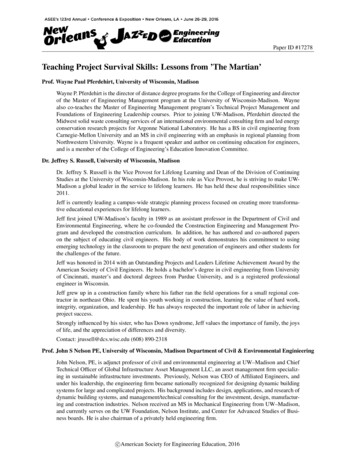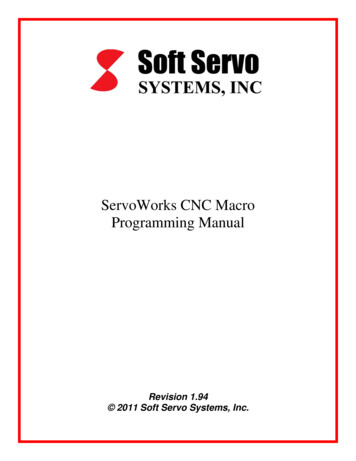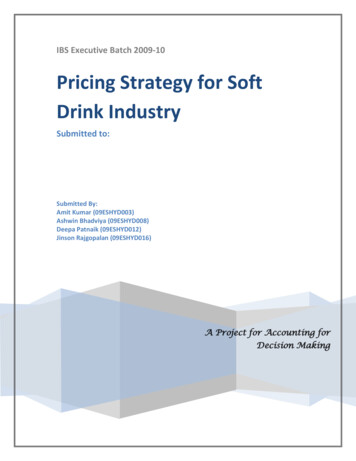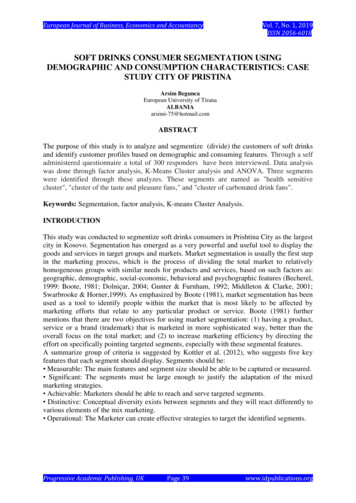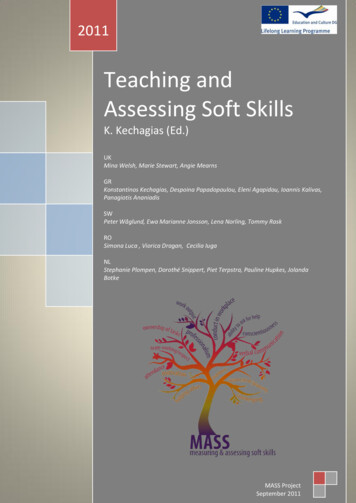
Transcription
2011Teaching andAssessing Soft SkillsK. Kechagias (Ed.)UKMina Welsh, Marie Stewart, Angie MearnsGRKonstantinos Kechagias, Despoina Papadopoulou, Eleni Agapidou, Ioannis Kalivas,Panagiotis AnaniadisSWPeter Wåglund, Ewa Marianne Jonsson, Lena Norling, Tommy RaskROSimona Luca , Viorica Dragan, Cecilia IugaNLStephanie Plompen, Dorothé Snippert, Piet Terpstra, Pauline Hupkes, JolandaBotkeMASS ProjectSeptember 2011
K. Kechagiase-mail: kkecha@hotmail.comUKMina Welsh, Marie Stewart, Angie Mearnse-mail: mina.welsh@angus.ac.uk, iverene.bromfield@angus.ac.ukGRKonstantinos Kechagias, Despoina Papadopoulou, Eleni Agapidou,Ioannis Kalivas, Panagiotis Ananiadise-mail: kkecha@hotmail.comSWPeter Wåglund, Ewa Marianne Jonsson, Lena Norling, Tommy Raske-mail: ewamarianne.jonsson@bollnas.se, peter.waglund@bollnas.seROSimona Luca , Viorica Dragan, Cecilia Iugae-mail: consiliereccd@gmail.com, cicitomus@gmail.comNLStephanie Plompen, Dorothé Snippert, Piet Terpstra, Pauline Hupkes,Jolanda Botkee-mail: p.terpstra@aventus.nl, jolanda.botke@zuidema.nl3
Publisher:1st Second Chance School of Thessaloniki (Neapolis)Str. Strempenioti, 1st and 3rd Gymnasium56760 Neapolis (Thessaloniki)ISBN: 978-960-9600-00-2Thessaloniki, 2011Teaching and Assessing Soft Skills by K. Kechagias is licensedunder a Creative Commons Attribution-NonCommercialNoDerivs 3.0 Unported License.Based on a work at www.mass-project.org.Permissions beyond the scope of this license may be availableat kkecha@hotmail.com.5
Table of ContentsTABLE OF CONTENTS . 7PREFACE . 13EXECUTIVE SUMMARY (EN). 15EXECUTIVE SUMMARY (GR) . 16EXECUTIVE SUMMARY (SW) . 17EXECUTIVE SUMMARY (RO) . 18EXECUTIVE SUMMARY (NL) . 20PART 1: INTRODUCTION . 22INTRODUCTION TO MASS PROJECT . 23Abstract. 23Main Goals . 23Products . 23Target Audiences . 23Finance . 24Partners . 24INTRODUCTION TO SOFT SKILLS AND GENERIC COMPETENCIES . 27Abstract. 27Introduction . 27Historical framework . 28Definitions . 30Ability/Capability . 30Skill . 31Key Competences . 32Soft Skills . 33Generic Skills . 33Basic Skills . 33Theoretical approaches. 33Types of socio-emotional competences . 33Perspectives . 34Frameworks . 357
European Union. 36United States . 38England and Wales . 40Canada . 41Australia . 44The OECD DeSeCo project . 46Target groups. 47Discussion/Conclusions . 47References. 48PART 2: SOFT SKILLS TEACHING . 53TEACHING SOFT SKILLS . 55Abstract. 55Introduction . 55Issues in teaching soft skills . 56Definition uncertainty and its consequences . 56Autonomous vs. intermixed teaching . 57Teaching practices . 58VET/University Students . 59Initial Education Students . 65Summary . 70References. 71MASS TEACHING . 78Abstract. 78Introduction . 78SkillZone . 79Narrative. 79Practices . 80Target Group Characteristics . 82Teaching materials . 82Soft skills included . 83Data Collection Methodology . 85Partners . 89Institutions . 89Characteristics of the MASS pilot groups . 91Discussion . 98References. 99PART 3: SOFT SKILLS ASSESSMENT . 107SOFT SKILLS ASSESSMENT.109Abstract. 109Introduction . 1098
Assessment basics . 110Definition . 110Formative and Summative Assessment . 112Assessment quality criteria . 115Assessment development . 117Competence based assessment . 118Soft Skills Assessment . 120Soft Skills Assessment Challenges . 128Summary . 130References. 131MASS ASSESSMENT .139Abstract. 139Introduction . 139Partner Institutions Characteristics . 140Target Group Characteristics . 140Data Collection Method . 141Methodology and Outcomes . 145Success criteria, plan and methodology . 145Initial Soft Skills Assessment . 150Progress Assessment . 152Final Assessment . 156Discussion . 178UK . 180GR . 181SW . 181RO . 182NL . 182Summary . 183References. 183APPENDIX 1: LEARNING MATERIALS . 190ENGLISH .191Introduction . 192Learning Byte 1 . 200Learning Byte 2 . 237Learning Byte 3 . 289Learning Byte 4 . 324Learning Byte 5 . 357Learning Byte 6 . 376Learning Byte 7 . 398Learning Byte 8 . 478Learning Byte 9 . 498Learning Byte 10 . 518Learning Byte 11 . 539Learning Byte 12 . 552Learning Byte 13 . 5719
Learning Byte 14 . 591Learning Byte 15 . 609Learning Byte 16 . 626Learning Byte 17 . 634GREEK .648Introduction . 649Learning Byte 1 . 665Learning Byte 2 . 684Learning Byte 3 . 701Learning Byte 4 . 714Learning Byte 5 . 730Learning Byte 6 . 741Learning Byte 7 . 753Learning Byte 8 . 778Learning Byte 9 . 790Learning Byte 10 . 802Learning Byte 11 . 816Learning Byte 12 . 824Learning Byte 13 . 834Learning Byte 14 . 844Learning Byte 15 . 855Learning Byte 16 . 866SWEDISH.875Introduction . 876Learning Byte 1 . 884Learning Byte 2 . 925Learning Byte 3 . 974Learning Byte 4 . 1006Learning Byte 5 . 1037Learning Byte 6 . 1054Learning Byte 7 . 1077Learning Byte 8 . 1154Learning Byte 9 . 1171Lesson Byte 10 . 1187Learning Byte 11 . 1209Learning Byte 12 . 1221Learning Byte 13 . 1237Learning Byte 14 . 1254Learning Byte 15 . 1265Learning Byte 16 . 1278Learning Byte 17 . 1287ROMANIAN .1299Introduction . 1300Learning Byte 1 . 130210
Learning Byte 2 . 1313Learning Byte 3 . 1331Learning Byte 4 . 1344Learning Byte 5 . 1354Learning Byte 6 . 1361Learning Byte 7 . 1369Learning Byte 9 . 1408Learning Byte 10 . 1416Learning Byte 11 . 1425Learning Byte 12 . 1430Learning Byte 13 . 1437Learning Byte 14 . 1444Learning Byte 15 . 1450Learning Byte 16 . 1456Learning Byte 17 . 1460DUTCH .1464Learning Byte 1 . 1465Learning Byte 2 . 1483Learning Byte 3 . 1508Learning Byte 4 . 1529Learning Byte 5 . 1544Learning Byte 6 . 1555Learning Byte 7 . 1566Learning Byte 8 . 1604Learning Byte 9 . 1616Learning Byte 10 . 1628Learning Byte 11 . 1640Learning Byte 12 . 3Learning Byte 13 . 15Learning Byte 14 . 22Learning Byte 15 . 28Learning Byte 16 . 41Learning Byte 17 . 51APPENDIX 2: REPORTS . 62ENGLISH . 63GREEK . 76SWEDISH.109ROMANIAN .12511
DUTCH .14812
PrefaceThe Measuring and Assessing Soft Skills Project (MASS, http://www.mass-project.org/ )represents over two years of hard work from a team of dedicated professionals from acrossEurope. All of our partners have a commitment to improving the quality of vocationaleducation and training experiences for their learners and all were willing to try somethingnew in order to achieve this.Most people recognise the acquisition and development of soft skills as important forprogressing in life and work. Those of us who work with disadvantaged young peoplerecognise that these skills are often under developed. Our project aimed to address that bypiloting new learning materials that raised awareness of what soft skills are, helped learnersto assess themselves, and identify where and how they could actively seek to improve theseskills within the context of their learning programmes. By doing so we all wanted to makean impact on our learners' life chances.We are very pleased with the results of our
education and training experiences for their learners and all were willing to try something new in order to achieve this. Most people recognise the acquisition and development of soft skills as important for progressing in life and work. Those of us who work with disadvantaged young people recognise that
